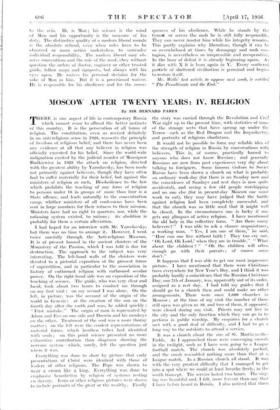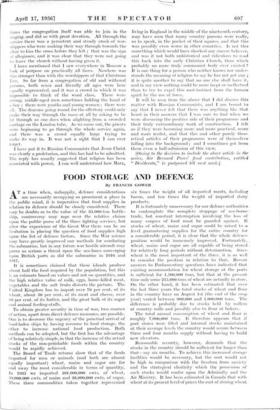MOSCOW AFTER TWENTY YEARS : IV. RELIGION
By SIR BERNARD PARES
THERE is one aspect of life in contemporary Russia which cannot cease to affront the better instincts of this country. It is the persecution of all forms of religion. The constitution, even as revised definitely in an anti-religious sense in 1928, reasserts the principle of freedom of religious belief, and there has never been any evidence at all that any believer in religion was officially executed for his belief. Since the world-wide indignation excited by the judicial murder of Monsignor Budkiew•icz in 1923 the attack on religion, directed with the greatest ability by Yaroslaysky, has been made not primarily against believers, though they have often had to suffer materially for their belief, but against the ministers of religion as such. Disobedience to the law which prohibits the teaching of any form of religion to .persons under 18 in groups of more than four is a State offence, and leads naturally to the concentration camp, whither ministers of all confessions have been sent in large numbers for their witness to their mission. Ministers have had no right to quarters, nor, while the rationing system existed, to rations ; its abolition is probably for them a certain alleviation.
I had hoped for an interview with Mr. Yaroslaysky, but there was no time to arrange it. However, I went twice carefully through the Anti-religious Museum. It is at present housed in the ancient cloisters of the Monastery of the Passion, which I was told is due for destruction. The approach to the subject was very interesting. The left-hand walls of the cloisters were devoted to a pictorial exposition of the grossest forms of superstition, and in particular to the association in history of enthroned religion with enthroned secular power. On the right-hand side was an exposition of the teaching of science. The guide, who was very clear and lucid, took about two hours to conduct me through on my first visit ; on my second I was alone. On the left, in picture, was the account of the origin of the world in Genesis ; at the creation of the sun on the fourth day after the earth and seas, he added quickly : " First mistake." The origin of man is represented by Adam and Eve on one side and Darwin and his monkeys on the other. Treatment of the soul was a more thorny matter ; on the left were the crudest representations of material forms, which heathen tribes had identified with souls ; on this point science presented no more exhaustive contribution than diagrams showing the nervous system—which, surely, left the question just where it was.
Everything was done to show by picture that early presentations of Christ were identical with those of leaders of other religions. The Pope was shown to wear a crown like a king. Everything was done to emphasise benediction by religion of systems resting on slavery. Icons or other religious pictures were shown to include portraits of the great or the wealthy. Finally the story was carried through the Revolution and Civil War right up to the present time, with statistics of some of the strange sects that have sprung up under the Terror—such as the Red Dragon and the Imyaslavtsy, and portraits of religious charlatans.
It would not be possible to form any reliable idea of the strength of religion in Russia by conversations with believers. This is, of course, practically barred to anyone who does not know Russian ; and generally Russians arc now from past experiences very shy about talking to foreigners. Some famous visitors to Soviet Russia have been shown a church on what is probably an ordinary work-day (for there is no Sunday now and the coincidence of Sundays and rest days is now quite accidental), and seeing a few old people worshipping and no one else (for in present-day Moscow one must work to eat), they may have judged that the battle against religion had been completely successful, and that the church was so little used that it might well be closed. In the circumstances one is lucky if one gets any glimpses of active religion. I have mentioned the old lady in the collective farm. " Are there many believers?" I was able to ask a chance acquaintance, a working man. " Yes, I am one of them," he • said. "How can one live without faith ? They too cry out, Oh Lord, Oh Lord,' when they arc in trouble." " What about the children ? " " Oh the children will often enough go with their parents ; of course some don't."
It happens that I was able to get one most impressive picture. I have mentioned that there were Christmas trees everywhere for New Year's Day, and I think it was probably hardly a coincidence that the Russian Christmas Day, our 7th of January, was, apparently out of its order. assigned as a rest day. I had told my guides that I should go to a church then and could make no other arrangements. There were once 1,600 churches in Moscow ; at the time of my visit the number of those still open was given as 40, and two of them, it appeared, were closed during my. visit. Priests may not live in the city and the only function which they can go in to perform is public worship. My enquiries for a church met with a good deal of difficulty, and I had to go a long way to the outskirts to attend a service.
It was a church about the size of St. Martin-in-the- Fields. As I approached there were converging crowds in the twilight, such as I have seen going to a League football match. The church was absolutely packed, and the crush resembled nothing more than that at a League match. In a Russian church all stand. It was with the very greatest difficulty that I managed to get into a spot where we could at least breathe freely, in the south transept. The service lasted two hours. The sing- ing was beautiful and, I felt, more fervent than any that I have before heard in RuSsia. I also noticed that three times the congregation itself was able to join in the singing; and did so with great devotion. All through the service there was a persistent and steady Crush of wor- shippers who 'were Making' their way through towards the altar to kiss the cross before they left ; that was the sign of allegiance, and it was clear that they were not going to leave the church without having given it.
I have mentioned that I saw everywhere in Moscow a look of purpose on practically all faces. Nowhere was this stronger than with the worshippers of that Christmas Eve. So far from a congregation of old and withered persons, both sexes and literally all ages were here equally represented, and it was a crowd in which it was impossible to think of the word class. There were strong, middle-aged men sometimes holding the hand of a boy ; there were youths and young women ; there were all. The deacons going round for the offertory could only make their way through the mass at all by asking to be let through as one does when alighting from a crowded carriage on the London tube. As we came out, the priests were beginning to go through the whole service again, and there was a crowd equally large trying to make its way in. It was not a sight that I can ever forget. • I have put it to Russian Communists that Jesus Christ was clearly a proletarian, and this has had to be admitted. The reply has usually suggested that religion has been associated with power. I can well understand how Marx, living in England in the middle of the nineteenth century, may have seen that many country parsons were really, so to speak, in the pocket of their squires, and that this was possibly even worse in other countries. Is not this something which would have shocked any sincere believer, and was it not both unhistorical and ridiculous to read this 'back into the early Christian Church, than which probably no more truly communist body ever existed ? It is one thing for a person who neither knows nor under- stands the meaning of religion to say he has not got any ; it is quite another to say that no one else shall have it,. and in my view nothing could be more inept or ineffectual than to try to expel this root-instinct from the human spirit by the use of force.
It will. be seen from the above that I did discuss this matter with Russian Communists, and I am bound to say that I never felt that there was anything like that heart in their answers that I was sure to find when we were discussing the positive side of their programme and their truly extraordinary work of construction. I felt as if they were becoming more and more pract lea], more and more realist, and that this and other purely theo- retical articles of their programme were of themselves • falling into the background ; and I sometimes got from them even a half-admission of this view.
[Owing to the decision to include the above article in the series, Sir Bernard Pares' final contribution, entitled "Desiderata," is postponed till 71C4 week.]













































 Previous page
Previous page